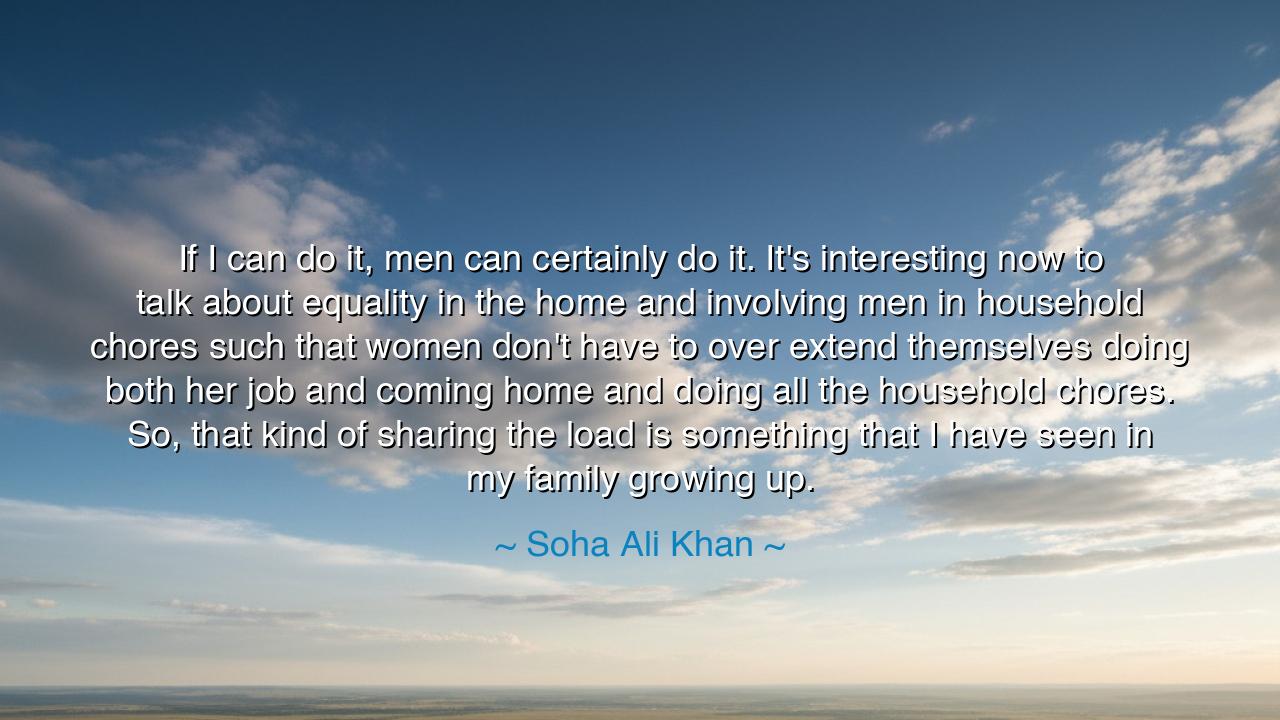
If I can do it, men can certainly do it. It's interesting now to
If I can do it, men can certainly do it. It's interesting now to talk about equality in the home and involving men in household chores such that women don't have to over extend themselves doing both her job and coming home and doing all the household chores. So, that kind of sharing the load is something that I have seen in my family growing up.






Hear the wise and measured words of Soha Ali Khan, who said: “If I can do it, men can certainly do it. It’s interesting now to talk about equality in the home and involving men in household chores such that women don’t have to overextend themselves doing both her job and coming home and doing all the household chores. So, that kind of sharing the load is something that I have seen in my family growing up.” These words, spoken with calm grace, carry a force that echoes through the ages — the call for balance, justice, and companionship within the most sacred of all societies: the home. Hers is not a demand of rebellion, but of reason, not a cry against men, but a plea for mutual dignity.
In this quote, Soha Ali Khan — an actress, writer, and daughter of two icons of Indian cinema and royalty — speaks from both heritage and personal understanding. Having witnessed equality modeled in her own family, she sees clearly what others still struggle to accept: that true partnership in life is built not only upon affection, but upon shared responsibility. She reminds us that equality is not confined to speeches or parliaments; it begins in kitchens and living rooms, in the quiet acts of daily life. The washing of dishes, the folding of clothes, the raising of children — these are not menial tasks, but the true work of coexistence.
In ancient wisdom, the home has always been regarded as the heart of civilization. The ancients taught that the balance between masculine and feminine forces sustains the universe itself — yin and yang, Purusha and Prakriti, heaven and earth. When one dominates and the other is burdened, the cosmic order falters. Soha’s words, then, are not modern sentiment alone; they are a reminder of this timeless truth. The home cannot thrive if one is the master and the other the servant. Love, when it is real, demands equilibrium — the sharing not just of joys, but also of duties.
Her reflection also shines a light on a quiet injustice that women have borne for generations: the double labor of modern womanhood. She goes to work, carries ambition, fights the same battles as her male counterpart — yet returns home to find another battle awaiting her, that of endless chores and unseen effort. The world celebrates her career but forgets her exhaustion. Soha Ali Khan challenges this imbalance gently yet firmly: if she can balance work and home, then so can men. Her tone is neither accusatory nor boastful; it is invitational — an opening for partnership, not competition.
History offers examples of how societies have flourished when both genders shared labor with respect and intention. In the early days of Sparta, women were not confined to the hearth but were trained in strength, discipline, and education — not because they sought dominance, but because the state recognized that strong women make a strong people. In contrast, where women were silenced and confined, nations stagnated. The ancients knew, as Soha reminds us now, that civilization is born in the harmony of shared effort. A household, like a city, stands firm when all its members contribute to its care.
What makes Soha’s insight particularly profound is her acknowledgment that change begins with example. She does not call for a revolution of anger, but for one of awareness. When she says, “I have seen that kind of sharing the load in my family,” she shows that equality is not an abstract dream — it is learned, modeled, and practiced. Children who grow up watching their fathers cook, clean, and nurture will carry forward that understanding into their own homes. Thus, the transformation of society begins not with laws, but with habits — with men and women standing side by side, not in symbolic equality, but in lived harmony.
Let this teaching, then, be passed down like an ancient commandment: love is not proven by words but by deeds. To honor your partner is to lighten their burden. To claim equality is to practice it. Let no one believe that the strength of a man diminishes by washing a dish, or that the grace of a woman is lessened by asking for help. For when both hands work together, the home becomes a temple — radiant, peaceful, and enduring.
So, heed the wisdom of Soha Ali Khan: if she can do it, so can others. Let men learn the nobility of care, and women the dignity of asking for balance. For the truest equality does not live in debate or declaration, but in the gentle rhythm of shared labor — where love becomes visible, and partnership becomes divine.






AAdministratorAdministrator
Welcome, honored guests. Please leave a comment, we will respond soon